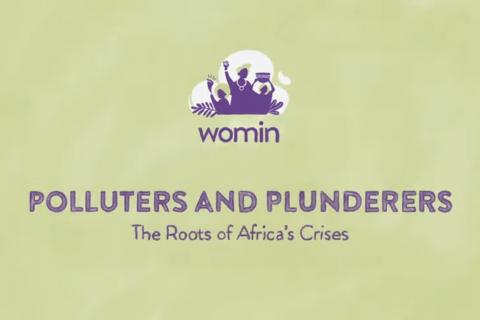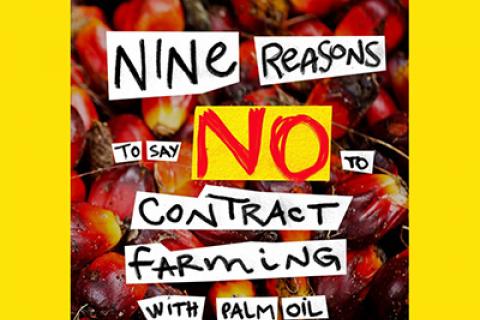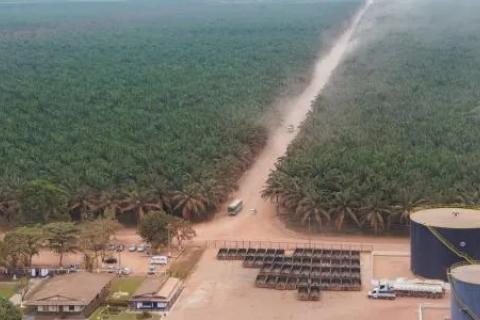The WOMIN African Alliance released the first in a series of animated short films. This animation tells the story that rural, peasant and working-class communities across the African continent have confronted from the start of colonisation to the present neoliberal capitalism.
Other information
Get to know the threats of Agriculture 4.0. and the possible resistance of peasant women. As the technological titans come to the countryside—with robots, mapping, data extraction, persuasion and espionage—they meet the peasant resistance: wisdom, experience, exchange and respect for nature. An animation by Red Tecla, together with the Global Women’s March, the ETC Group and REDES—Friends of the Earth Uruguay, tells us this story.
Offsetting scams are the new climate denial… and it has dangerous consequences. Greenpeace released this short video to highlight how French oil giant Total claims they’re committed to a clean energy future, but they are trying to drill for oil in a pristine forest in the Republic of Congo - home to many indigenous communities. See the video here.
The report, “Violence against the Indigenous Peoples of Brazil—2020,” published annually by the Indigenous Missionary Council of Brazil (CIMI, by its Portuguese acronym), reflects the image of tragic year for the country’s native peoples.
The Oilwatch Latin America network released this statement in October 2021 to stress the urgency of ensuring that fossil fuel energies remain underground.
The Mekong/ASEAN Environmental Week (MAEW) is an annual regional platform and process for deeper sharing among people in the region of Southeast Asia, where key actors can exchange, analyze and debate on emerging issues that significantly affect them. This year the focus was on “Redesign ASEAN: Peoples' Voices in World Crises." Discussions covered the environmental situation as well as the economic, political, and other aspects that impact the region and its people.
In a recent publication, the Ecuadorian organization, Acción Ecológica, reveals how the extraction of balsa wood has affected Amazonian indigenous territories—impacting both the social fabric and the forests in the foothills of the Andes Mountains (including the Cuyabeno Wildlife Reserve). The balsa wood “boom” is a result of the Chinese wind industry, since China is the country that has built the most wind farms in recent years. The publication also addresses how the balsa wood business is structured in Ecuador, as well as its main producers and exporters. Read it in Spanish here.
An excerpt from a forthcoming book entitled “Climate Opium” explores how we are overdosing on false solutions to climate change, so much that the biggest mammals on earth are being forced into carbon pricing schemes.
As the devastating effects of climate change become more immediate and severe, corporate interests are promoting the use of unproven and potentially dangerous genetically engineered (GE) trees for climate mitigation schemes, including carbon offsetting and an emerging bioeconomy. A statement released by The Campaign to STOP GE Trees warns of the ecological and social harm of using GE trees, in “false solution” climate mitigation schemes.
A recent publication form the WRM explains how contract farming with palm oil companies works, and why it is a serious threat to peasant farming and food sovereignty. The booklet looks at nine of the most common promises that companies make, and most importantly, the information they conceal behind each promise. The publication is available in English, Portuguese, French, Spanish and Bahasa Indonesia.
A recent article from Mongabay warns on how the palm oil industry is expanding rapidly in the Brazilian Amazon. Oil palm coverage in northern Pará increased almost five-fold between 2010 and 2019. Studies have shown that the conversion of forests into oil palm plantations is a major problem. Most of Brazil’s palm oil production is controlled by eight companies.
An academic article from Janina Puder exposes how the palm oil industry in Malaysia heavily relies on the cheap labour of migrant workers in order to keep palm oil profitable and globally competitive. Palm oil is often associated with social inequalities concerning land ownership, land use and access to land, but the exploitation of migrant workers is a further significant, albeit lesser-known, expression of social inequality that has been caused by industrial oil palm cultivation and the steady expansion of the palm oil sector in Malaysia since the 1960s.











